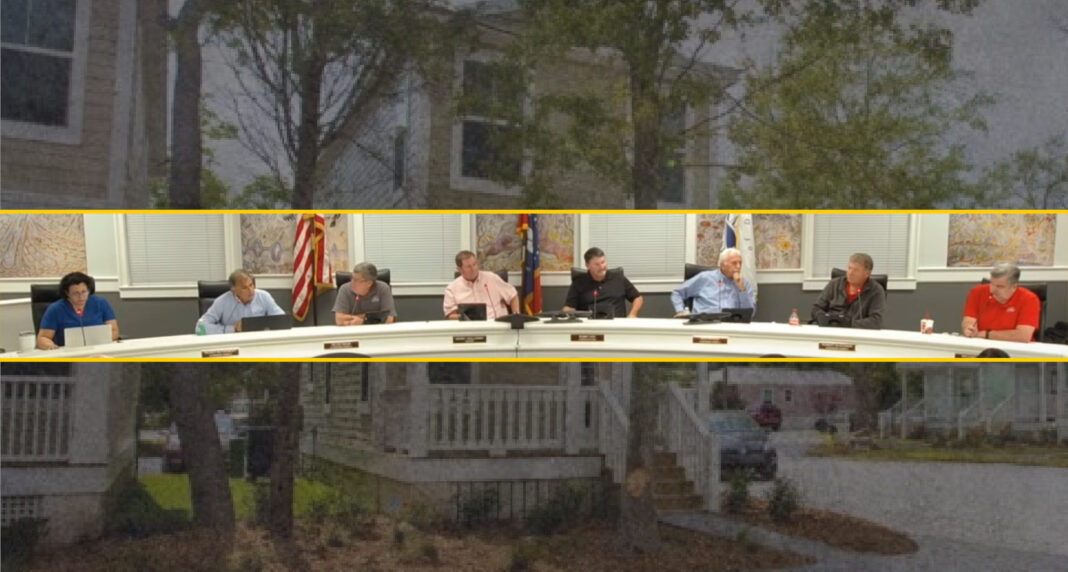OCEAN SPRINGS, MS — Discussions about short-term rentals took center stage at Tuesday night’s Board meeting as Ward 2 Alderman Rickey Authement revisited his proposal to amend the city’s short-term rental ordinance. While the moratorium he floated last week was not enacted, the board agreed to have City Attorney Will Norman draft amendments to address concerns raised by Authement and other board members.
Authement’s remarks built on his initial proposal from the November 5 meeting, where he suggested a moratorium to pause new short-term rental permits. On Tuesday, he clarified his position, emphasizing three key issues: the lack of meaningful public input in the permitting process, the impact of accessory dwelling units being converted into short-term rentals, and concerns about over-saturation changing the character of residential streets.
“Short-term rentals were actually an ordinance. Since that time, I think we’ve come a long way,” Authement said. “But there are some things I think that need to be looked at moving forward.”
The Public Input Problem
One of the most significant concerns raised was the issue of public input in the permitting process. According to Authement, while public hearings are held for new short-term rental applications, the current ordinance limits the board’s ability to deny permits based solely on community feedback.
“We’re asking people for public input and not being able to follow through with it,” Authement explained. He called for revisiting the ordinance to allow meaningful public influence in decisions about where short-term rentals are permitted.
Alderman Ken Papania echoed this frustration, stating, “There’s public input, but it doesn’t amount to anything. A street doesn’t need to become a hotel. I agree totally, and I think we need to sit down and talk about this.”
Accessory Dwelling Units Under Scrutiny
The board also debated the use of accessory structures, such as garages and guest houses, as short-term rentals. Authement argued that such conversions undermine the character of R1 neighborhoods, which are zoned for single-family dwellings.
“I don’t believe that the intent was ever to do rentals on accessory structures,” he said. “If you have two different families staying on a single-family lot, whether it’s long-term or short-term, it changes the nature of the neighborhood.”
Community Development Director Carter Thompson pointed out that accessory dwelling units are currently allowed in certain zones under specific conditions, including being tied to the primary structure’s water and sewer lines. She suggested clarifying these restrictions in the permitted use chart.
Saturation Concerns
Authement and Papania both raised alarms about the impact of too many short-term rentals on individual streets. “Saturation on a street could change the character of the street,” Authement warned. Papania added that over-concentration could turn neighborhoods into de facto hotel zones, a sentiment echoed by several board members.
A Deliberate Approach
Acting City Attorney Will Norman advised against implementing a moratorium in the interim, stating that existing applications near the city’s cap for short-term rentals should not be blocked. Instead, he recommended focusing on drafting ordinance amendments to address the concerns raised.
“From a moratorium perspective, I would say legally we shouldn’t limit any,” Norman said. “What we’re talking about is changing the ordinance going forward as permits come up for renewals.”
Authement expressed agreement with Norman’s approach, emphasizing that the goal is not to strip existing short-term rental operators of their permits but to refine the rules for future applications. “The intention is not to take it away from anyone who already has it,” he clarified. “But moving forward, I think we need to address this.”
Resident and Candidate Reactions Highlight Division Over Short-Term Rentals
The proposed changes to short-term rental regulations have sparked a variety of reactions from residents and candidates alike. Steve Tillis, a candidate for Ward 1 Alderman, expressed support for Alderman Rickey Authement’s efforts, noting widespread frustration among residents. “Many citizens I’ve spoken with are frustrated by the constant influx of new tourists and the disruption it brings to our neighborhoods,” Tillis said. “It’s critical that we find a solution that prioritizes the stability and charm of our community over unchecked development.”
Shannon Grace, running for Ward 4 Alderman, also called for stricter rules, including a buffer system to reduce density. “I believe there needs to be a reduction in the number of short-term rentals allowed in our city and a removal of the no-cap limit in the downtown overlay zones,” she said.
Others were less optimistic about the intentions behind the moratorium. Ellen Hall criticized the timing, suggesting political motivations. “It’s rich that they are saying this after so many times they’ve increased STR caps. Is it election season?” she remarked.
Joe Jewell echoed her sentiment, calling the effort a political ploy. “This will be rescinded after the elections. We need new leadership that restricts the commercialization of our family neighborhoods,” he said.
The division showcases the larger debate: while some see short-term rentals as disruptive to neighborhood charm, others emphasize their economic benefits. The coming ordinance amendments will test whether city officials can strike a balance between these competing priorities.
What’s Next?
The board tasked Norman with drafting amendments to the ordinance, with input from the aldermen and planning department. These revisions are expected to address accessory dwelling units, public input in the permitting process, and possible changes to the city’s cap on short-term rentals.
The proposed changes are set to be reviewed at a future board meeting. Until then, the short-term rental debate remains a key issue for Ocean Springs, balancing neighborhood preservation with the economic opportunities these properties bring to the city.
Watch the discussion in real time below:


